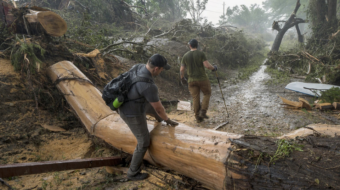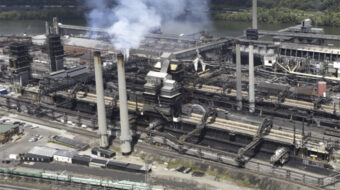Book Review
“Field Notes from a Catastrophe”
By Elizabeth Kolbert
Bloomsbury USA, 240 pp, 2007
Greenhouse gases can be both a curse and a blessing. Too little in the atmosphere leads to the cooling of the earth, too much to its heating up. If the atmosphere were free of greenhouse gases, the average temperature of the earth would be approximately zero degrees Fahrenheit (a new ice age), instead of the present 57 degrees.
For nearly 12,000 years a rough stabilization of these gases in the atmosphere has created favorable conditions for the steady and continuous evolution of nature and society.
Swings in the concentration of greenhouse gases occurred during this period, but were never of a magnitude that either heated up or cooled down the planet to the point where catastrophic ecological consequences, say mass extinctions of species, occurred. But this “golden” ecological age is coming to an end.
The reason is this: the period of rough stabilization of greenhouse gases in the atmosphere is giving way to another period in which the concentration of greenhouse gases is rapidly building up. The effect of this is to trap and reradiate solar energy, the source of heat, back to the earth that would otherwise dissipate into space. In so doing, the earth’s average temperature is rising to levels not reached in millennia
Carbon dioxide, the most conspicuous of the greenhouse gases and a product largely of the burning of fossil fuels, has been accumulating in the atmosphere in the past century at a pace faster than anytime over the past 20,000 years. To make matters worse, over the last two decades, the rate of increase has spiked upward. As a result, compared to pre-industrial levels, the earth’s average temperature has nudged up 0.6-degrees Centigrade.
Tipping point That doesn’t seem like much, but nothing could be further from the truth. Its impact on our planet is observable and serious. Moreover, if temperatures rise another 1.4 degrees Centigrade, the consequences, many scientists argue, will be catastrophic. Global warming is not a linear process in which the impacts are additive and easily reversible. Rather it contains threshold or tipping points which when reached will quickly accelerate the warming process and amplify its impacts manifold. Sea levels, say experts, could rise as much as 16 feet if global temperatures climb two-degrees Centigrade tipping point.
While the earth’s temperature fluctuates due to the normal oscillations of greenhouse gases, what is notable about the current warming is that its explanation lies elsewhere.
Product of human activity The current rise is the product of human activity that emits, and increasingly so, more greenhouse gases into the atmosphere than the earth is able to reabsorb. Or to say it differently, a virtuous circle, in which the emission of greenhouse gases into the atmosphere and their re-absorption by natural processes was in rough equilibrium for thousands of years, has given way to a vicious circle wherein the discharge of greenhouse gases //as a result of human activity// is overwhelming the earth’s ability to absorb them and thus heating up the planet.
Global warming widely accepted Admittedly, there remain naysayers of global warming, but then again you can probably find a few people who still contend that the earth is flat. For some time, global warming was, forgive the pun, a hotly contested issue, in part because it was an altogether new phenomenon and in part because of the denial industry funded by the oil, gas, and coal corporations that profit handsomely from the exploitation of these natural resources. These corporations and their extreme right supporters in political corridors of power went to great lengths to claim that climate science and its discovery of human driven climate change were a fraud.
But in recent years, as incontrovertible evidence has piled up, the denial industry has been reduced to rearguard actions, such as obstructing legislative action, portraying as quixotic alternative forms of energy, and extolling the possibilities of easy technological fixes – not to mention insisting on tax payer dollars to develop and promote these fixes that in many cases are untested, illusory, and of little help.
In the meantime, the reality of global warming and its anthropogenic cause, that is, warming is the result of human activity, has become broadly accepted.
And none too soon And none too soon! After all, as temperatures climb upward, weather events (hurricanes, tsunamis, tornadoes, etc.) become more frequent and intense; the thawing of the permafrost covering vast tracts of northern lands in Russia and elsewhere continues and releases more methane (a greenhouse gas) into the atmosphere; drought and raging forest fires become commonplace; sea levels are rising or receding depending on where you live; and animals are migrating to the poles, but in many instances not fast enough. In fact, alpine animals are being pushed off the planet while the habitat of polar bears is literally melting underneath them.
The greatest threat, say some scientists, is the destabilization of ice sheets in the Artic, Antarctica, and Greenland, which are disappearing faster than anyone predicted.
Ten years to act According to James Hansen, one of the foremost experts on climate change, we have only 10 years – not to decide, but to dramatically reduce greenhouse gas emissions into the atmosphere. Failing that, he contends, we will enter into a new geological epoch. In other words, the next decade can’t be business as usual, continuing willy-nilly our present production and consumption patterns. Rather we are in a race against time, a race against the onset of //the warmest interglacial period in a half million years.//
Captured in Kolbert’s book All this and much more is captured in Elizabeth Kolbert’s highly readable and compelling book on global warming, “Field Notes from a Catastrophe.” Readers of Kolbert’s book will be both fascinated and frightened as she takes us, as the book’s title suggests, to locations where global warming is happening or is the subject of scientific study. At each location, we meet interesting people who give a vivid, concrete, and troubling picture of the causes and impacts of global warming. In Alaska we learn of the receding ice shelves; in Siberia the thawing of permafrost; in Iceland the shrinkage of the glaciers; in England the changing migratory patterns of butterflies; and in laboratories; we hear experts of climate change discuss the mushrooming danger.
What makes the book especially appealing is that while it doesn’t go overboard in technical jargon, it doesn’t sacrifice scientific understanding either.
‘Silent Spring’ of our time Some reviewers have called it the “Silent Spring” of our time, referring to the landmark book written by Rachel Carson in the 1960s that presciently warned our country of the gathering dangers of human-made environmental destruction.
At the time of its publication in 1961, some heeded Carson’s warning, Barry Commoner and the late Communist environmentalist Virginia Brodine among others come to mind, but most of us didn’t understand the enormity of the environmental threats. We went along in our lives believing that the world had dangers (thermo-nuclear war for one) to be sure, but never thinking that the sustainability of our planet and its diverse species was one of them.
On some level we assumed that the capacity of the earth and its biosphere (the zone of the earth where life naturally occurs, extending from the deepest crust to the lower atmosphere) to absorb our destructive patterns of production, consumption, and living were without limits, that the natural world would reproduce itself no matter how badly we abused it. Nature in this view was to be dominated and its bountiful resources and variety were simply fodder to be consumed as desired or as profitable. Now we know that such views are both mistaken and extremely harmful.
Unexplored: capitalism What Kolbert doesn’t explicate in her book is the connection between planetary warming and the internal dynamics of capitalism. Had she done this, she would have found that capitalism’s main dynamic is one of endless growth and endless accumulation of capital (profit maximizing). Indeed, if we were looking for a metaphor to capture the dynamic of capitalism, the word treadmill would come to mind and, moreover, a destructive treadmill that would over time undermine the natural and human conditions for economic, societal and biospheric sustainability.
And yet, while the transcendence of capitalism is a necessary step to fully resolve global warming as well as to create a sustainable economy and society, it would be a profound mistake to say that little or nothing can be done until socialism’s arrival. It is imperative to take measures to mitigate and reverse planetary warming now. Waiting for socialism is not an option.
Immediate steps Of special importance in this regard is the immediate formation of a broad and active coalition of diverse political forces, cross class alliances, if you will, at the local, national, and international levels. Their overriding task is to take immediate and radical steps to curb carbon emissions into the atmosphere.
In the course of this (and other) struggles, millions will come to understand from a new angle the destructive power of capitalism and the compelling necessity of socialism – a deeply democratic society that neither exploits nature nor labor.
“The private property of individuals in the earth will appear just as absurd as the private property of one man in other men. Even an entire society, a nation, or all simultaneously existing societies taken together, are not owners of the earth. They are simply its possessors, its beneficiaries, and have to bequeath it in an improved state to succeeding generations, as boni partres familias (good heads of households).” Karl Marx, Capital Vol. 1
Sam Webb (swebb @cpusa.org) is national chair of the Communist Party.










